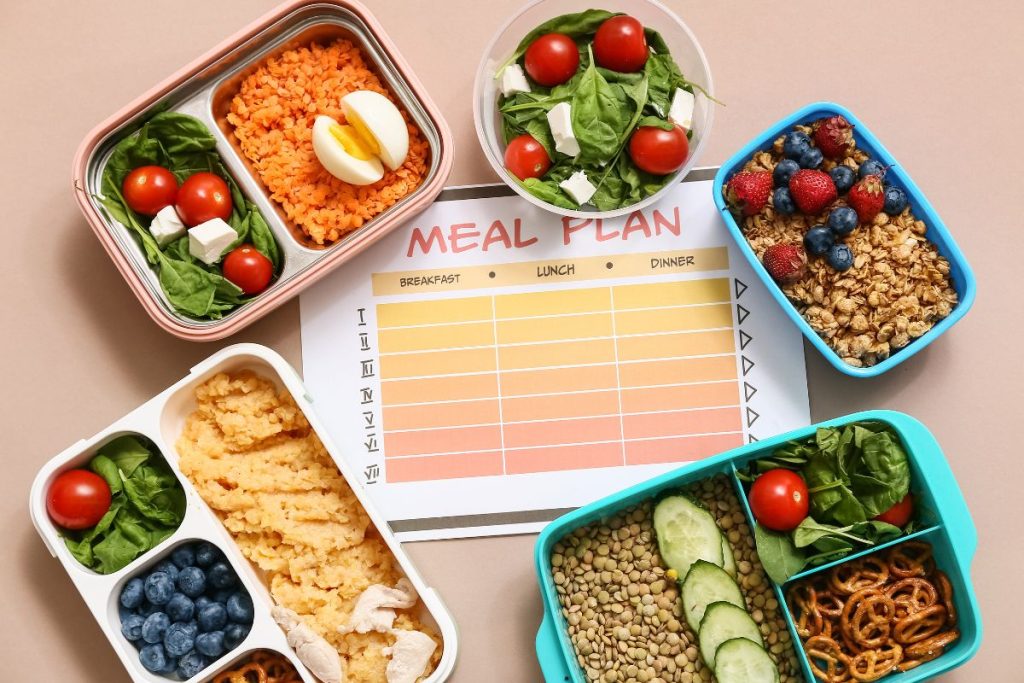It all starts with high energy and vitality from what you eat. A well-rounded vegetarian diet will maintain your body’s full supply of nutritional needs, keeping your meals palatable and satisfying. This 7-day healthy eating plan targets the improvement of energy, supports metabolic function, and promotes wellness. The diet includes protein, complex carbs, healthy fats, and lots of fruits and veggies.
DAY 1: Energy Kickstart
Overnight oats prepared with chia seeds soaked in almond milk, topped with fresh berries and honey.
- Snack: Apple slices with peanut butter.
- Lunch: quinoa salad with chickpeas, cherry tomatoes, cucumber, and lemon-tahini dressing.
- Snack: Carrot and cucumber sticks with hummus.
- Dinner: Lentil and vegetable stir-fry with brown rice.
Tip: Even out your energy level by starting your day with protein and fibre.
Day 2: Protein-Packed Power
- Breakfast: Greek yoghurt parfait with granola, flaxseeds, and seasonal fruits.
- Snack: A handful of mixed nuts.
- Lunch: A salad with spinach, tofu, avocado, and pumpkin seeds. It’s topped with balsamic dressing.
- Snack: Roasted chickpeas or edamame.
- Dinner: Vegetable curry with lentils, served with whole-grain naan or brown rice.
Hint: Add plant-based proteins, such as tofu, lentils, and chickpeas, to maintain energy.
Day 3: Heart-Healthy Boost
- Breakfast: Toasted whole-grain bread, lightly golden, with a thin layer of avocado spread. Top it with thin tomato slices and sprinkle sesame seeds on top.
- Snack: Spinach, banana, and almond milk all blended into a refreshing fruit smoothie.
- Lunch: Roasted vegetables and quinoa bowl, topped with a tahini drizzle.
- Snack: trail mix with dried fruit and seeds.
- Dinner: Stuffed bell peppers filled with black beans, corn, and quinoa.
Tip: Flaxseeds and walnuts have omega-3s that help keep the heart healthy.
Day 4: Fibre Focus
- Breakfast: oatmeal with sliced banana, walnuts, and a dollop of peanut butter.
- Snack: slices of pear or apple with almond butter
- Lunch: Whole-grain wrap with hummus, roasted vegetables, and leafy greens.
- Snack: Celery sticks with either cottage cheese or hummus.
- Dinner: Chickpea and spinach stew, served with whole-grain bread.
Tip: Foods rich in fibre are filling and aid in the proper digestion of food intake.
Day 5: Anti-Inflammatory Foods
- Breakfast: Turmeric smoothie with mango, pineapple, ginger, and almond milk.
- Snack: Fresh berries with a few almonds.
- Lunch: Lentil soup served with mixed green salad as a side dish.
- Snack: Carrot and beetroot sticks with guacamole.
- Dinner: Vegetable skewers with tofu and quinoa, grilled.
Tip: Add anti-inflammatory spices such as turmeric, ginger, and garlic to help in the boosting of immunity.
Day 6: Balanced and Nourishing
- Breakfast: Chia pudding prepared with coconut milk, topped with kiwi and strawberries.
- Snack: Small bowl of roasted soy nuts or almonds
- Lunch: Brown rice and vegetable stir-fry with tempeh.
- Snack: Fresh fruit or vegetable juice.
- Dinner: Casserole made of eggplant and chickpeas, served with wholegrain bread.
Tip: Eat balanced meals with proteins, carbs, and healthy fats to boost your energy.
Day 7: Refresh and Recharge
- Breakfast: Smoothie bowl with spinach, banana, berries, chia seeds, and granola.
- Snack: A handful of nuts or seeds.
- Lunch: Vegetable and bean chilli, with either quinoa or brown rice.
- Snack: Greek yoghurt with honey on top.
- Dinner: zucchini noodles with a tomato basil sauce and roasted vegetables.
Tip: Dinner should be light but healthy so that one rests well and recovers through the night.
Key Benefits of This Vegetarian 7-Day Plan
- Sustained Energy: A good mix of complex carbs, proteins, and healthy fats keeps you energised throughout the day.
- Better Digestion: Eating fibrous foods, like legumes, whole grains, fruits, and veggies, helps keep your gut healthy.
- Better Immunity: Plant-based foods provide a wealth of immunity-enhancing vitamins, minerals, and antioxidants.
- Weight: High-fibre and nutrient-dense meals keep appetites in control, thus maintaining healthy weights.
- Heart health: Omega-3s, nuts, seeds, and veggies all help keep your heart healthy.
Frequently Asked Questions (FAQ)
Q1: Is it possible to do this diet if I am a vegan?
You can adapt most meals with little effort. Swap dairy and eggs for plant-based options like almond milk, soy yoghurt, or tofu.
Q2. What if I am allergic to nuts?
You can substitute nuts for seeds such as pumpkin, sunflower, and chia seeds. Their nutritional content is pretty similar.
Q3: How much water should I drink?
Drink at least 8–10 glasses of water every day. This helps the body stay hydrated and boosts digestion. It also keeps energy levels up.
Q4: Is meal exchange within the plan allowed?
Of course, this is a flexible plan; it includes alternative meals in case of your choice or the availability of ingredients.
Q5. Will this help me with weight loss?
This program is for energy and vitality. The balance of high fibre, together with regular exercise, maintains a healthy weight.
Q6: How Can I Get Enough Protein?
Legumes, lentils, tofu, tempeh, dairy products, and seeds contain protein. Counting the amount of protein in your diet can help you keep track of what you need to eat each day.
Conclusion
A vegetarian 7-day healthy eating plan like this will not only energise the body but will also result in improved overall well-being and vitality. Indeed, you can surely feel more active, focused, and nourished every day by adding to your diet a mix of proteins, healthy fats, complex carbohydrates, and fresh vegetables and fruits.


